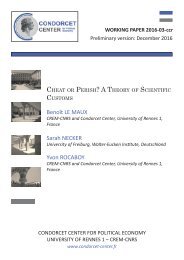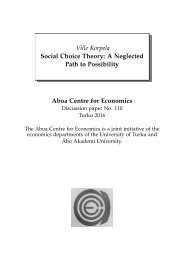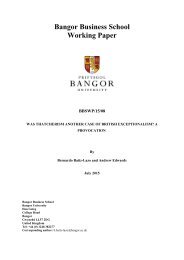MEMORANDUM
n?u=RePEc:hhs:osloec:2016_018&r=hpe
n?u=RePEc:hhs:osloec:2016_018&r=hpe
Create successful ePaper yourself
Turn your PDF publications into a flip-book with our unique Google optimized e-Paper software.
Alpers takes to be the Leontief firm. Wassily Wassilievich discussed in the dissertation the<br />
strike action in 1896 without bringing himself into the story. From his dissertation topic<br />
Leontief Sr. could be denoted as a labor economist, his special interest was the conditions<br />
of the laboring class. But he seemed to have quite comprehensive knowledge of Russian<br />
economy and history as well. One may read out of his dissertation a political message<br />
expressing belief in what the trade unions can achieve in terms of social and political<br />
reform. The dissertation was at its final stage during the political turbulence in Russian<br />
known as the 1905 revolution. The revolution comprised bloody suppression but also<br />
opened up possibilities for political reform, which in the end were thwarted.<br />
His granddaughter, Svetlana Alpers, has scrutinized the dissertation and characterized<br />
it as “neither historical nor analytic, but rather a journalistic affair.” 16 The characterization<br />
suggests that Leontief Sr.’s dissertation was not a particularly impressive one, perhaps<br />
reflecting to some extent that he had conducted a minimal amount of university studies<br />
before he embarked on the doctoral dissertation. But even so, its descriptive approach<br />
may not have implied that it was of a lower scholarly quality than many others. Leontief Sr.<br />
The doctoral advisor of Leontief Sr. in Munich, Lujo Brentano, was a scholar of great<br />
credentials; he was an economist adhering to the German historical school with strong<br />
interests in social reform, a true Kathedersozialist.<br />
Childhood and formative years<br />
When the Leontief couple were on their own again and the situation in Russia had<br />
calmed down they made preparations for returning to St. Petersburg as soon all formalities<br />
of the doctoral degree had been completed, which was not until July 1906. The<br />
preparations comprised Zlata’s conversion to Orthodoxy which eventually took place on 2<br />
August 1906. Zlata became Genia; her full Russified new name was Evgeniia Borisovna.<br />
Two days later followed marriage in the Greek Orthodox Church in Munich. The<br />
motivation for the conversion and re-marriage was, we may presume, the religious<br />
conviction of Leontief Sr. but perhaps more important as reverence for the Leontief family<br />
who had been supportive of Leontief Sr. throughout his years abroad and to whom he<br />
intended to return with his wife and son.<br />
The Leontief couple returned from Munich to St. Petersburg in mid-August 1906.<br />
Little Wassily was just over one year old. At the return, Wassily was baptized and entered<br />
into the birth register of the Russian Orthodox Church as born on 5 August 1906 in St.<br />
Petersburg. The doubly incorrect birth data became the official birth place and date.<br />
Throughout Leontief’s life in Russia from one to nineteen years of age he (and his parents)<br />
lived with this odd fact of being one year older than officially recorded. Leontief’s<br />
16 Alpers (2013, pp.17-18).<br />
10





